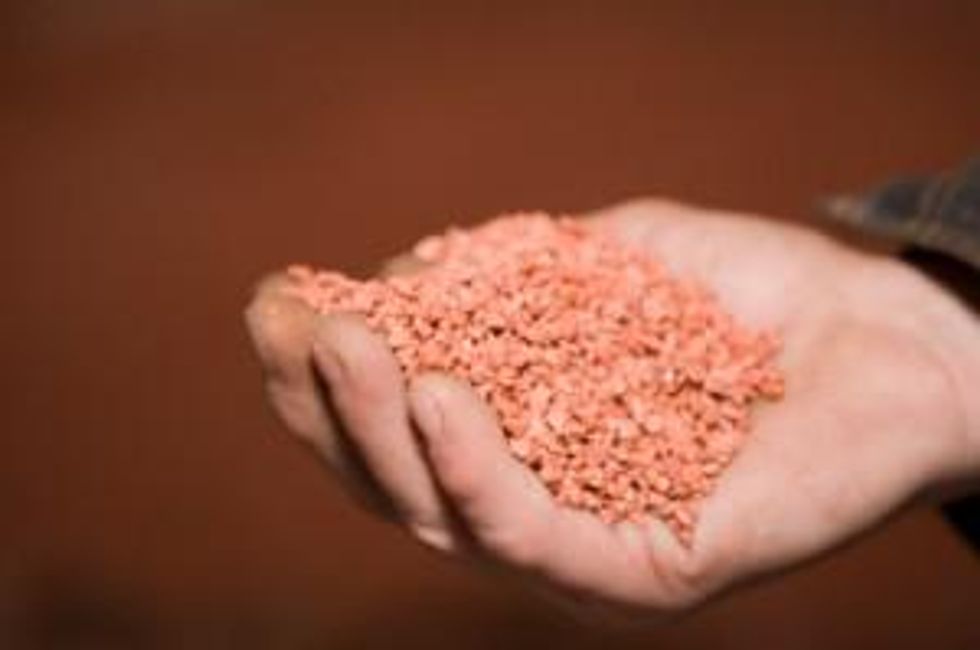Karnalyte’s recent deal could be one of many this year as junior potash projects are likely to be a key component of emerging Asian economies’ efforts to lock down long-term, stable supplies of potash.
The deal struck between Alberta’s Karnalyte Resources (TSX:KRN) and India’s Gujarat State Fertilizers & Chemicals (BSE:500690) has cast light on the ability of junior potash plays to fill Asian consumers’ demand for potash fertilizers.
Karnalyte, based south of Calgary, Alberta, with carnallite deposits in the heart of Saskatchewan’s potash basin, signed a deal that will see it receive upwards of $60 million from Gujarat. Gujarat has also made a 20-year commitment to purchase 350,000 tonnes of potash at market price from Karnalyte; that amount will increase to 600,000 tonnes per year in the second phase of the deal, the company said in a statement.
Karnalyte’s website states that the company expects to start construction on its Wynyard carnallite potash project late in the first quarter of 2013 — or early in the second — and plans to spend $626 million on the first phase of development. That should see it produce 625,000 tonnes of potash annually, with that amount later increasing to 2.125 million tonnes per year.
On the heels of Karnalyte’s announcement, Reuters reported that Saskatchewan-based Encanto Potash (TSXV:EPO) is in talks with an Indian fertilizer company, Rashtriya Chemicals and Fertilizers (BSE:524230), which, if successful, could see Rashtriya buy up to 2 million tonnes of potash from Encanto.
Potash juniors in spotlight
The recent attention given to junior potash projects by major emerging market players began in earnest last year, with Arizona-based Prospect Global Resources (NASDAQ:PGRX) inking a 10-year potash supply deal with Chinese fertilizer company Sichuan Chemical Industry Holding Group. Prospect also received a $100-million investment from Apollo Global Management, and along with Encanto and Karnalyte, holds one of the few projects with a completed or near-completed feasibility study.
Siddharth Rajeev, vice president and head of research at the equity research group Fundamental Research, told Potash Investing News that we should expect “a lot more activity this year with junior potash companies,” including “a lot more consolidation in the potash sector as companies with good assets and low current valuations are driven down by weak potash prices.”
Rajeev said the Kanalyte deal and the potential Encanto contract are “very significant for the junior potash space,” which was severely hurt last year after prices plunged from $800 to $460 in just a few years.
Western Potash (TSX:WPX), which is developing the Milestone deposit in Saskatchewan, has long been considered a takeover candidate — India’s Rashtriya Chemicals and Fertilizers expressed interest in forming a joint venture back in September. Joel Jackson, an analyst with BMO Capital Markets, has indicated that the company is undervalued.
“Milestone [Western’s keystone project] is one of the most advanced junior potash projects, and some parties may view Western Potash’s market capitalization as low, relative to the cost to procure potash concessions and advance a project to feasibility,” Jackson said in a research note.
Busting Canpotex’s hold
With potash juniors receiving greater attention from strategic partners in India and China, the influence dominant potash suppliers like Canpotex — the offshore marketing arm for the big three North American producers: Mosaic (NYSE:MOS), Agrium (TSX:AGU,NYSE:AGU) and Potash Corporation of Saskatchewan (TSX:POT,NYSE:POT) — have over price is likely to diminish in the future.
“We are going to see decreasing control by big firms in setting prices going forward,” Rajeev said, noting that junior potash plays will be an important part of that process.
“With few big players setting the prices that impact consumers in India and China … developing nations need to acquire long-term, stable potash supply.”
Rajeev said his group is strongly bullish on the potash sector because slow, steady growth from developing nations with decreasing arable land per capita is driving the need to boost agricultural efficiency.
At the end of 2012, Canpotex and China’s Sinofert Holdings (HKEX:0297) established a new potash supply deal, setting prices $70/ton lower than they were just nine months earlier, according to an article published in The Wall Street Journal. Despite lower potash prices set within China, the world’s bellwether for potash contract pricing, the 1 million tonnes for delivery indicate stronger demand than analysts initially expected.
Securities Disclosure: I, James Wellstead, hold no direct investment interest in any company mentioned in this article.
